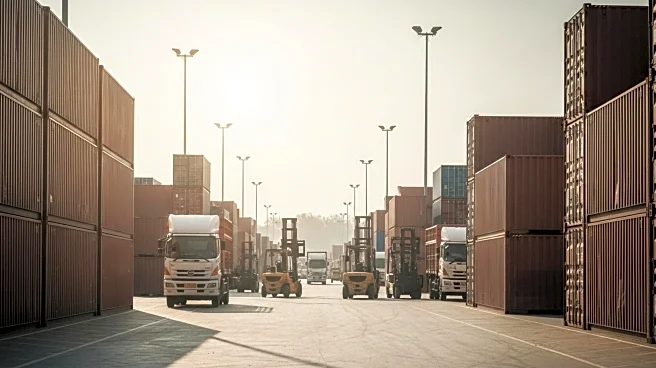What's Happening?
Yard management systems (YMS) are increasingly recognized as pivotal in enhancing supply chain efficiency. These systems streamline operations by providing real-time visibility and process optimization, which are crucial in reducing operational costs and detention charges. The integration of AI-powered automation in YMS allows for better synchronization between warehouse and transportation systems, eliminating blind spots and improving inventory management. Companies like Trane have successfully implemented YMS to match inbound container arrivals with dray carrier plans and dock appointments, significantly reducing detention costs. The adoption of YMS is seen as a strategic move to transform yards from sources of frustration into competitive advantages, offering substantial operational and financial benefits.
Why It's Important?
The implementation of advanced yard management systems is vital for companies facing increasing operational costs and supply chain complexities. By enhancing visibility and automating processes, YMS can significantly reduce detention fees and improve dock utilization, leading to better inventory management and overall supply chain performance. This technology is crucial for companies aiming to maintain a competitive edge in the logistics industry, as it addresses inefficiencies and bottlenecks that can hinder operational flow. The successful deployment of YMS can lead to measurable cost savings and improved throughput, making it a critical investment for businesses seeking resilience and efficiency in their supply chain operations.
What's Next?
As supply chains continue to grow in complexity, the role of yard management systems is expected to expand further. Companies may increasingly adopt AI and automation technologies to anticipate and resolve bottlenecks before they occur, enhancing predictive logistics capabilities. The integration of YMS with warehouse and transportation management systems will likely become more seamless, enabling real-time updates and dynamic adjustments based on actual ETAs. This evolution will drive further innovation in the logistics sector, with companies seeking scalable, customized solutions to meet their unique operational needs.
Beyond the Headlines
The shift towards advanced yard management systems highlights a broader trend in the logistics industry towards automation and data-driven decision-making. This transition not only improves operational efficiency but also raises ethical considerations regarding labor practices and the potential displacement of manual jobs. As companies invest in technology to streamline operations, they must also consider the impact on their workforce and explore ways to upskill employees to adapt to new technological environments.










